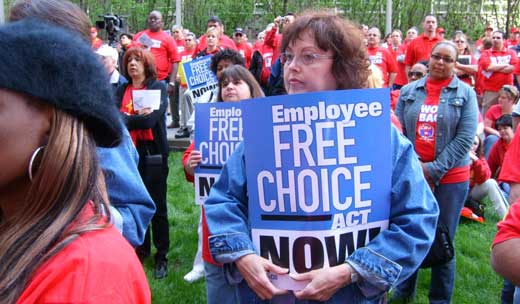
Strengthening labor law, especially the right to organize, and penalties against law-breakers, is part of a comprehensive plan for shared prosperity the AFL-CIO Executive Council endorsed last week.
Prosperity Economics: Building An Economy For All, by Yale political scientist Jacob Hacker and Yale law student Nate Loewenthall, covers everything from labor law to campaign finance to restoring manufacturing to repealing the Bush tax cuts.
The 71-page document also calls for ultimate repeal of the Supreme Court’s Citizens United ruling, which has opened the floodgates to hordes of corporate campaign cash. That cash silences workers’ voices and corrupts democracy, it says. And after demolishing what it calls myths that fuel the current “austerity economics,” Hacker proceeds with a structure for an alternative.
“America desperately needs a reinvigorated middle class and an economy where dignity and opportunity are rights shared by all and where workers are our economy’s most valuable assets,” the council said in urging policymakers to adopt its recommendations. “But this vision will remain unfulfilled so long as the right to organize and bargain collectively remains an empty promise for most American workers.”
Though the fed highlighted Hacker’s support for workers’ rights, it actually is only a small part – less than half a page – of his comprehensive plan. He mentions the Employee Free Choice Act, labor’s top – but now-dead – legislative cause, which would help level the playing field between workers and bosses in organizing and bargaining.
“Fundamental labor law reform legislation is needed to give employees a fair shot at obtaining workplace representation,” Hacker writes. He then advocates stronger penalties against labor law-breakers, which are also included in the EFCA.
The U.S. also needs “a more comprehensive legal regime to support collective bargaining,” Hacker writes. U.S. labor law and subsequent court rulings exclude millions of workers from protection, including farm workers, lower-level supervisors, domestic and home health care workers and many government workers.
Despite that, Hacker notes “important work is under way around the country to organize new types of workers in new forms of relationships.” He specifically mentioned the taxi workers in New York, whose organizing committee – which has broadened its efforts to Philadelphia and other cities – recently got an AFL-CIO charter. “We need a legal regime that matches new economic realities and gives all workers a meaningful right to choose to be represented by a union,” Hacker concludes. The report is available from http://www.prosperityforamerica.org.
Photo: The Employee Free Choice Act, filibustered by Republicans, would have greatly improved labor rights. Via Flickr

MOST POPULAR TODAY

‘Warning! This product supports genocide’: Michigan group aims to educate consumers

“Trail of Tears Walk” commemorates Native Americans’ forced removal

Ohio: Franklin County treasurer attends Netanyahu meeting, steps up Israel Bond purchases

Hold the communism, please: SFMOMA’s Diego Rivera exhibit downplays artist’s radical politics

After months of denial, U.S. admits to running Ukraine biolabs






Comments